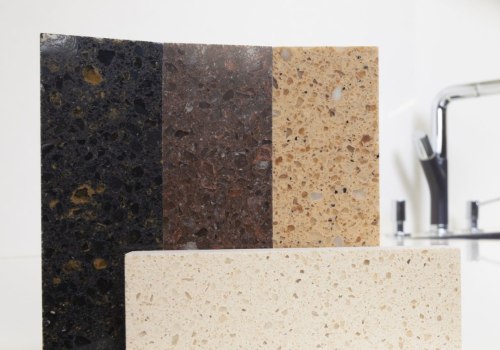Quartz is actually harder than granite and therefore more durable. In fact, quartz is almost indestructible, and since it's not porous like granite, it's easy to keep your countertops relatively bacteria free. Both granite and quartz (engineered stone) are premium countertop materials that add real estate value to a home. Granite appeals to people who like all-natural materials, while quartz offers easier maintenance and slightly better durability.
For all practical purposes, quartz is maintenance free. Its non-porous surface repels dirt and moisture to resist stain damage. The hardness of the resins resists scratching and chipping well. Standard all-purpose cleaners work well for cleaning.
Quartz and granite countertops are priced similarly per square foot, and granite countertops have the largest price variation. Granite can be more expensive than quartz at times, depending on the availability of a color and pattern. Quartz is sometimes more expensive because of the treatments it receives during manufacturing. Granite countertops are extracted from pure stone.
The stone is cut into slabs or made into tiles and then polished for installation. Quartz countertops are made of crushed quartz that is mixed with coloring pigment and resin as a binder. The quartz content is typically 92% to 94%. Quartz and granite are great choices for bathroom or kitchen countertops.
Granite has a more natural look, but is often more expensive, while quartz is cheaper but looks a little more artificial. Granite is more resistant to heat, while quartz is more resistant to staining. Use our guide to the differences between quartz and granite to decide which material is the best choice for your new countertops. Stone countertops are popular in kitchens for a reason.
Granite is often cited as the most durable natural countertop material available and is known to resist cracks and chips. As a man-made material, quartz is slightly higher on the hardness scale and is slightly more resistant to damage. Both granite and quartz countertops come in a variety of shades and patterns to fit your kitchen's unique color palette. Whether in the kitchen or in the bathroom, your countertops will be exposed to heat, in the form of hot curling irons or stovetop pots.
Both countertop materials are overwhelmingly made of natural materials, but granite countertops come out a little later, as they are made of 100 percent stone, while quartz includes natural materials, color pigments, and polymer resins that bind the materials together. It's worth noting that some of the quartz countertop manufacturers, such as Silestone and HanStone, treat their countertops with a coating that fights germs and improves hygiene. When choosing countertop materials for a kitchen or bathroom, many homeowners prefer the look and durability of stone over laminate, tile or wood. Installing black granite or dark brown granite countertops can help disguise long-lasting marks and stains.
Granite countertops are a heated debate among interior designers, but whether one material is better than the other comes down to what your home needs from a countertop. My granite countertop around the sink breaks from moisture ingress through the space between the sink rim and the countertop. Thanks to this artificial production, quartz countertops have benefits that are not available to natural stone countertops.






